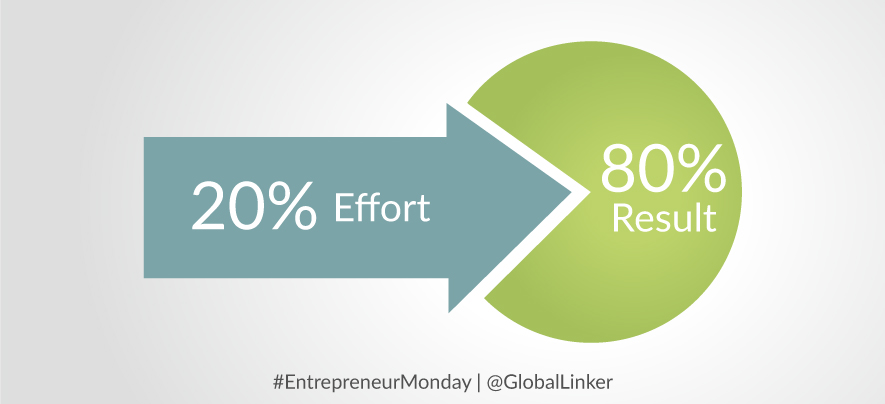The 80/20 Rule Can Streamline Your Life & Business

Business Development
484 week ago — 5 min read
In this edition of #EntrepreneurMonday series, we bring to you a universal formula to streamline your business and enhance productivity.
Real greatness very often lies in sheer simplicity. More than a century ago, an Italian Economist, Vilfredo Pareto, observed that the wealth distribution in his country was unequal, whereby 20 percent of the people owned 80 percent of the wealth. After Pareto’s observation about the 80/20 ratio in wealth distribution, others started noticing a similar pattern in almost all aspects of business – 20% of something accounted for 80% of results. This phenomenon is called Pareto’s Principle.
Interestingly, you can apply the 80/20 rule to most facets of your business and it can be used for a quick or detailed analysis of any situation. Here are some widely used applications of the 80/20 rule in business:
1. To Do List – You could use the 80/20 principle to formulate your ‘to do’ list for the day. Work out a list of things to do for the day. Identify 20% of those tasks that will have an 80% impact. Then tackle those tasks first.
2. Problem Solving – Use the Pareto Principle in problem solving. List down a problem and identify the 20% elements that could solve 80% of the issues in that problem. Once you have tackled this component, the remaining 80% of the issues will automatically get tackled or become easy to solve, since the earlier effort has made way for these to be solved easily.
3. Team Conflict – Identify the team’s key conflict issues. You will notice that 20% of the issues are probably causing 80% of the problems. If you address these 20% issues, you would have solved 80% of the problems and the team itself can solve the remaining 80% of the issues. Your job is to help the team resolve their own conflicts, and by tackling the instrumental 20%, you are paving the way for them to resolve the rest and feel good that they resolved it internally without any intervention.
4. De-Cluttering – Imagine the peace you would have and thereby the productivity you would get if you were to only cut down on the clutter that you see everywhere around you! Offices that maintain a clean and de-congested look produce better results. Peep into the desks of your staff members and chances are you will find drawers full of papers and files that confuse more than produce. This creates a loss of energy and loss of focus. Identify the 20% of the things that need spring cleaning within the office, you will notice that as much as 80% of the paper that you see lying around has less than 20% utility and 20% of the paper has the maximum utility. Pareto to your rescue again.
5. Marketing – Again you will notice that almost 80% of your results come form 20% of your marketing efforts. You may also use this principle to identify that 20% of your segment that gives you 80%of the business or leads to 80% conversions. Shouldn’t your business be focusing its efforts on that 20% segment? If you were to do an analysis of these activities, chances are you will notice that around 20% of these activities are yielding 80% of the results. Or, you may notice that 20% of the activities excite your employees the most. Focusing on those 20% activities will probably get you the maximum results while time spent on the remaining 80% activities can be put to better use.
6. Cost Control – This is probably something that we have all experienced. We often tend to negotiate over purchase of products or services that carry very little impact or significance, while we gloss over those which carry the maximum impact. A Pareto Analysis can actually reveal the true picture and ensure that you cut down on the truly wasteful expenses and not the useful elements.
To sum up, Pareto’s Principle is a great prioritising tool that helps you sift through tasks and classify them accordingly. The results that a Pareto’s Analysis throws up are often something that we always knew – but the act of formalising the process and articulating it, helps. It is not just the principle but the framework that makes its application so powerful.
Share with us how you have used the 80/20 rule in business to your advantage.
Posted by
GlobalLinker StaffWe are a team of experienced industry professionals committed to sharing our knowledge and skills with small & medium enterprises.
Network with SMEs mentioned in this article
View GlobalLinker 's profile
Most read this week














Comments (2)
Share this content
Please login or Register to join the discussion